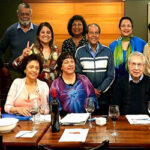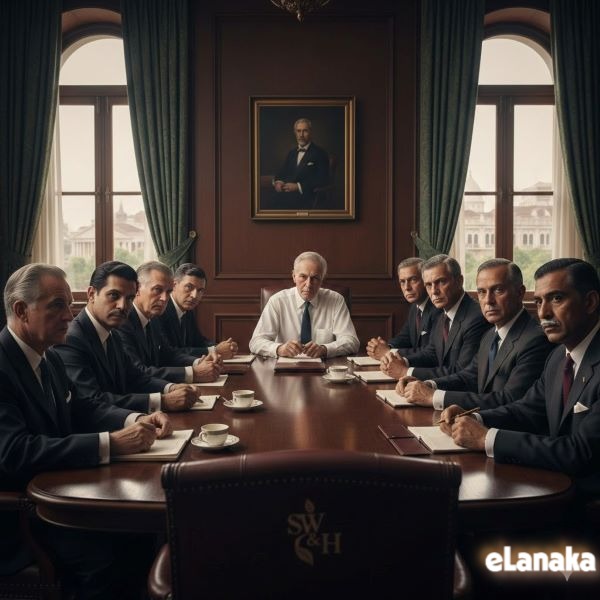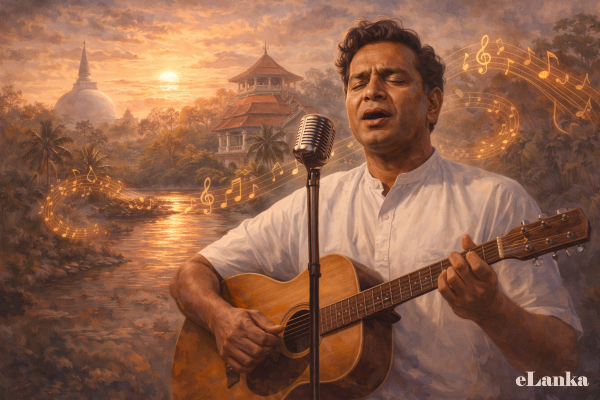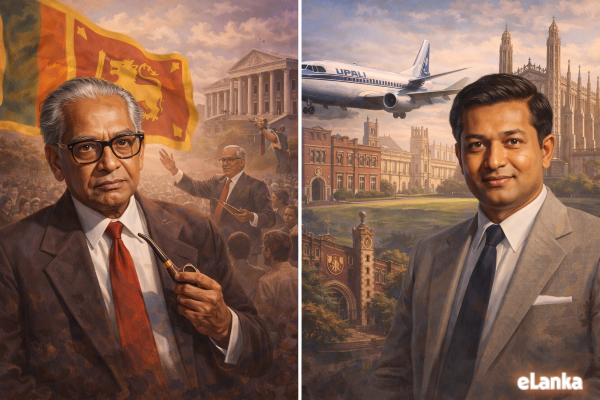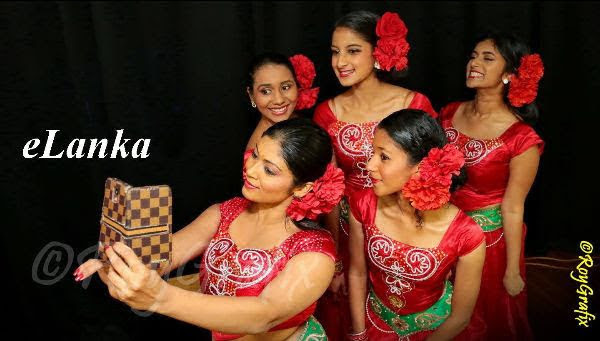The Burgher Exodus from Sri Lanka: A Reading in 1988
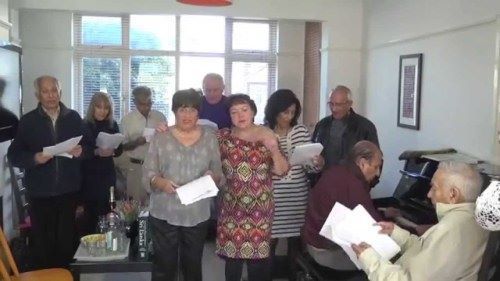
source:-thuppahis
Barbara Crossette, in New York Times way back in 1988 …. where the title runs thus “Colombo Journal; A Proud People, Scattered and Forgotten by Time”
In Sri Lanka, a country torn by violence, the holiday season is perhaps most poignant for a small minority that has not been part of the ethnic strife at all. They call themselves the Dutch Burghers, but the name, most generously defined, can cover a rich ethnic mix of Portuguese, Dutch, British and other Europeans who settled here over several centuries.
The Burghers, who are Christians, also number among themselves the Eurasian descendants of Europeans and high-born Sinhalese or, less often, Tamils. Ethnic Sinhalese account for about 74 percent of the Sri Lankan population of about 16 million; Tamils, 18 percent.
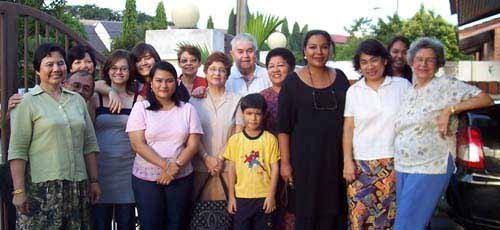
Once a wealthy, visible and influential population, there are no more than 30,000 Burghers now, and their numbers continue to dwindle.
‘Very Few of Us Left’ ”They are mostly all gone now,” said Pieter Keuneman, the leader of the Communist Party of Sri Lanka and one the country’s best-known Burghers. ”All my friends and relatives have gone to Heaven, to the other place or to Australia,” he said. ”There are very few of us left.” Those who remain, Mr. Keuneman said, do not vote for him. Burghers are a middle-class, professional community with moderate political opinions.
”Most of our people emigrated, to Australia, or Canada, England and some to the States, especially after 1956,” said Percy Colin-Thome, a retired Supreme Court judge who is president of the Dutch Burgher Union of Ceylon, a cultural and social organization that also publishes a scholarly journal on Sri Lankan history. ”The Burghers felt that they were being outcast by the Sinhalese Language Act of 1956.”
In 1956, Prime Minister S. W. R. D. Bandaranaike – the late husband of Sirimavo Bandaranaike, who ran unsuccessfully for President this year – enacted a ”Sinhala only” language act. Tamils felt the discrimination most immediately, and this became one of the root grievances that led to a Tamil autonomy movement and civil war nearly 30 years later. The Tamil language has now been officially restored to equality with Sinhalese.
For the Burghers, the setback was to be more serious in the long run. ”We were ruined by the Sinhala-only Act, because by then English had become our mother tongue,” said Mr. Colin-Thome, a descendant of a Swiss soldier, Pierre Thomet, who came to what was then Ceylon in 1778 to fight as a mercenary for the Dutch East India Company under the Swiss Count de Meuron.
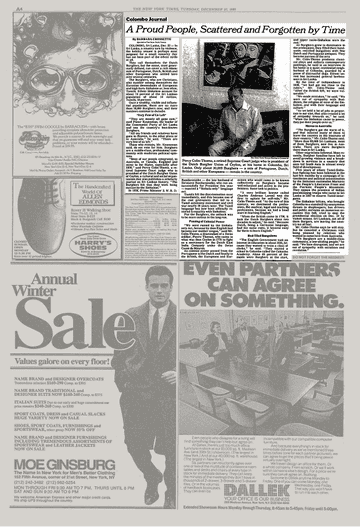
Passing of Colonial Power
As colonial power passed from the Portuguese to the Dutch and finally to the British, the Europeans and Eurasians who would come to be known collectively as Burghers became well-educated and active in the professions. Some took to politics.
”A very brilliant lawyer called Charles Ambrose Lorenz was the first to agitate for self-rule,” Mr. Colin-Thome said. ”At the turn of this century, we dominated the professions, the medical, legal and teaching professions, because we had a head start in learning English.”

C.A. Lorenz and company – key drivers of the journal YOUNG CEYLON — an erudite organ questioning British rule in the years 1850-52
”When the British came in 1796, it took the Dutch Burghers about two decades to adjust,” he said. ”Because Dutch, being a Germanic language, had the same roots, it became easy for them to learn English.”
”The English Government took an interest in education in about 1835, because they wanted to train a class of clerks,” he said. ”They started a school in Colombo called the Colombo Academy. About 65 percent of the pupils were Burghers at the start, and upper caste-Sinhalese were the rest.”
Red-Tiled Bungalows
As Burghers grew to dominance in the professions, they filled their handsome, red-tiled bungalows with fine Dutch and Portuguese antiques. They became patrons of the arts. Mr. Colin-Thome produces classical plays and collects contemporary paintings, he said in an interview in his home in a quiet residential neighborhood of Colombo, guarded by a posse of distrustful dogs. Ethnic unrest has increased general lawlessness in Sri Lanka.
By the time of independence in 1948, ”we had got too close to the rulers,” Mr. Colin-Thome said. ”After the British left, we were vulnerable.” ”We made mistakes,” he said, ”We were out of sympathy with Buddhism, the religion of most of the Sinhalese, and with their language and culture. As we held a lot of jobs in proportion to our size, [but] that also created a lot of antipathy towards us,” he said. ”When the Sinhalese came to power, they put their people over us.”
Moves to Australia
”The Burghers got the worst of it, and that induced many of them to leave the country in the interests of their country,” Mr. Colin-Thome said. ”More than 60,000 Sri Lankans, most of them Burghers, now live in Australia. There are more Burghers there than in Sri Lanka.”
Other migrations followed. Most recently, Burgher families have left to avoid growing violence and a breakdown in services in a country that once led South Asia in almost every field of development.
Five years of ethnic Tamil-Sinhalese fighting has been followed in the last few months by a campaign of intimidation and political assassination by the Sinhalese nationalist Marxists of the People’s Liberation Front and the Patriotic People’s Movement. They oppose the presence of Indian peacekeeping troops who came to Sri Lanka in 1987 to disarm Tamil insurgents.
The Sinhalese leftists, who brought Colombo to a standstill by anonymous threats to shopkeepers, bus drivers and public servants on numerous occasions this fall, tried to stop the presidential election on Dec. 19 by violent means. Sri Lankans, not all of them Burghers, are leaving the country out of fear.
Mr. Colin-Thome says he will stay. But he canceled a Christmas visit being planned by relatives who wanted to come here from Australia. ”We Burghers are a middle-class community, a law-abiding people,” he said. ”We hate disruption, and we are out of sympathy with socialism and revolution.”
A version of this article appears in print on Dec. 27, 1988, Section A, Page 4 of the National edition with the headline: Colombo Journal; A Proud People, Scattered and Forgotten by Time.




